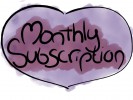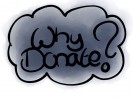Happy Bi Visibility Day!
Unsurprisingly, I’ve been thinking about bisexuality even more than usual today. I knew that I wanted to say something about it. About why it’s important. Why Bi Visibility Day is a big deal to me. It took me until now to really click on what I wanted to say. After all, I’ve already written my bi manifesto. And because there are some incredibly insightful commenters ‘round here, my addendum to my bi manifesto.
Here’s what I’ve got today:
Bi people get a lot of shtick from gay people. While some of this is straight-up biphobia, there’s another facet that’s far more complex: the idea that bisexuality is always a privileged category with respect to gayness.
It looks self-evident at first glance. Gay people experience homophobia and heterocentricism. These things are Bad. Bi people are sometimes in same-sex relationships (where they experience homophobia too) but sometimes in different-sex relationships. Different-sex relationships are considered the norm, so the people in them must be privileged, right? And this means that bi people get to spend half their time benefiting from privilege and have an all-round easier time of it.
It’s a pity that it’s straight-up wrong. You see, when people talk about bisexuals as being privileged in all ways with respect to lesbian and gay people, they miss one of the most important facets of human experience: the need to belong.
Coming out as anything isn’t easy. But in most cases, gay people have somewhere to come out into- the gay community. Everyone knows that most cities have gay spaces. And when gay people get into relationships, they can feel reasonably secure that the person they’re with isn’t overtly homophobic.
I’m not saying that this is always the case. But in general? There are spaces for gay people.
Bi people don’t have that. I said some things last year about this. Here:
One of the most important divisions within how bi+ people navigate and experience relationships is not between whether the people we date are men or women- it’s whether they’re queer or straight. Queer/LGBTQ culture, with its DIY attitude towards gendered roles in relationships and with our common experiences of self-discovery, coming out, and being out, is its own particular thing. It’s a set of shared understandings, and gay people pretty much always have that in common with partners. Bi+ people? Not necessarily. And so much of queer cultures were created as a different way of thinking about and doing relationships more-or-less in opposition to heteronormativity. But as bi+ people, whether or not we come from within queer cultures and ways of doing relationships, our lives are often defined by our relationships happening both within and outside those cultures. Some of the people we love (of all different genders!) will be queer. Some of the people we love will be straight and will not have had- or may not understand at all- queer experiences and their significance. But we still have, and those relationships don’t take from the experiences that we have had and who they have made us.
We occupy a position at, or on both sides of, a boundary or threshold. We are forced into a binary.
And then we go outside.
Leave the house with your partner. Walk down any street. Grab a coffee. Go visit your extended family. Go on holiday together. Live together. Have a family. Get sick. Grow old. In the meantime, go to work, or out with your friends. Talk about your lives. Do anything- anything– outside closed doors together with your partner. See what happens. Depending on how your relationship is viewed- as gay or straight, because our society brooks no middle ground- all of this will be different.
And it has nothing to do with you or your partner. This isn’t about you or about them. It’s about the assumptions made by others about them- assumptions that, of course, can either be relatively constant throughout your days and years, or vary between one pair of eyes that sees you and the next.
It varies. It changes. With one person you have all the respect and benign invisibility that heteronormative expectations (no matter how incorrect) can give you. With another you have to watch your back, and there will always be people who’ll sigh and call your love a waste. But while mononormativity demands that each of these experiences be neatly packaged into one person, both of these are or have been part of your life. Where you are given respect, a scared part of you is watching your back. Where you are not, you rage against that unfairness all the more because you know that this is no better or worse than that.
And you never, ever know for sure whether in a week or ten years you will be in a situation where you are seen as us and this, or as them and that.
We occupy a position at, or on both sides of, a boundary or threshold. We are forced into a binary.
I said lots more things in that post- I think that Past Me was onto something there, by the way.
Lesbian and gay people need to start understanding this. They really do. I’m so tired of having to defend my sexuality in front of people who are supposed to get it. I’m tired of worrying if the nifty gay person I just met is going to think less of me when they find out my orientation. I’m tired of hanging out in gay spaces wondering if I’ll be welcome if they know.
And that- that sense of never really having a space to be sure that you’ll be welcome- isn’t a small thing. It’s the biggest thing there is.
People are social creatures. We rely on our family, friends and community. If we face exclusion- as so many LGBTQ people do- we need those spaces even more.
I’m tired of arguing for this.
I’m tired of gay and lesbian people shoving us into a corner. Neglecting- sometimes outright refusing- to say the B word. Telling us that we’re confusing, that we should shut up and accept the scraps they give us, smile nicely for the campaign photographs but never, ever stand up and be counted for who we are.
What I’d really like? I’d really, really like to see some gay people arguing it for me. I’d like to see gay people taking an active part in looking at the spaces they create, and asking how they can make them inclusive of bi people. How they can make the bi people who are already there feel welcome. I’d like to see gay people taking a long, hard look at their own actions and doing the work of deconstructing the ways in which they exclude bis. I’d like to see them acknowledging how their biphobia and bi erasure hurt people. I’d like to see them calling out when bisexuality is treated as a joke or pushed aside. I’d like an apology.
That’s what I’d like to see. I won’t be holding my breath.
Even bloggers have to pay the bills! Monthly subscriptions- no matter how small- help give me the security to devote time to this place and keep a roof over my head. If you like what you read, please do help out:





Sounds like what some children of interracial couples go through.
The notion that bi folk get hetero privilege when in hetero (ish) relationships is more of a problem about society assigning value to relationships than it is about bi folk being in incidentally hetero relationships.
That wasn’t spectacularly clear. Let me try again:
Queer folk shouldn’t blame Bi+ folk if they happen to have some hetero privileges extended to them because they happen to be in a relationship that the majority perceives as being straight. That’s the fault of the shitty majority.
I think that’s clearer?
Clear as day 🙂
And see also: how many lesbians I’ve seen talking about how “disappointed” they are when their fave bi celebrity gets involved with a man. She’s still bi! She’s still queer! Her sexuality isn’t about you!
Well writ.
Yes you’re right gays and lesbians are the oppressors of bisexual people. They are themselves at the top of the pyramid and they use all their dark powers to discriminate against bisexual people, it’s really awful. I don’t know how they get away with it, there should be a class action against gay and lesbian people. Maybe a special international tribunal that will set these people “straight” and make the light on their anti-bi hate crimes. Seriously!
She is *not saying that*.
If anything, she’s saying “You know what it’s like to be treated poorly because of who you love, so why are you doing that s*** to other people?”